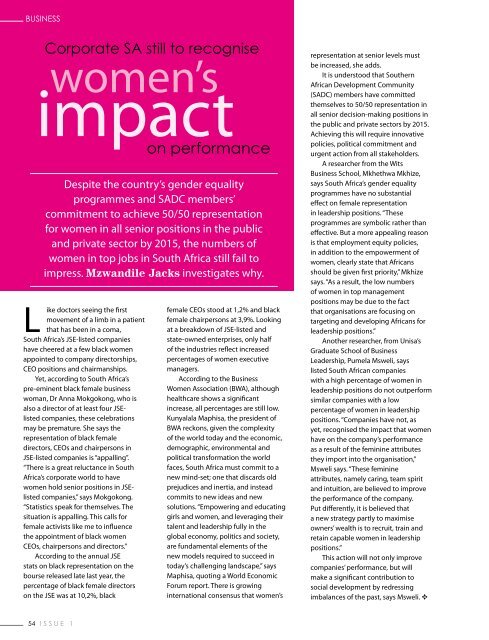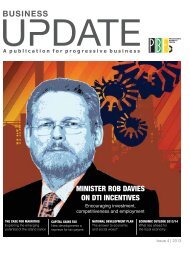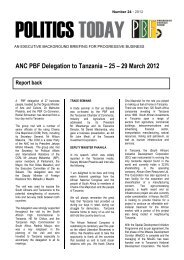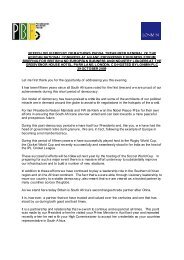SAFARI - the Progressive Business Forum website
SAFARI - the Progressive Business Forum website
SAFARI - the Progressive Business Forum website
- No tags were found...
Create successful ePaper yourself
Turn your PDF publications into a flip-book with our unique Google optimized e-Paper software.
BUSINESSCorporate SA still to recognisewomen’simpacton performanceDespite <strong>the</strong> country’s gender equalityprogrammes and SADC members’commitment to achieve 50/50 representationfor women in all senior positions in <strong>the</strong> publicand private sector by 2015, <strong>the</strong> numbers ofwomen in top jobs in South Africa still fail toimpress. Mzwandile Jacks investigates why.Like doctors seeing <strong>the</strong> firstmovement of a limb in a patientthat has been in a coma,South Africa’s JSE-listed companieshave cheered at a few black womenappointed to company directorships,CEO positions and chairmanships.Yet, according to South Africa’spre-eminent black female businesswoman, Dr Anna Mokgokong, who isalso a director of at least four JSElistedcompanies, <strong>the</strong>se celebrationsmay be premature. She says <strong>the</strong>representation of black femaledirectors, CEOs and chairpersons inJSE-listed companies is “appalling”.“There is a great reluctance in SouthAfrica’s corporate world to havewomen hold senior positions in JSElistedcompanies,” says Mokgokong.“Statistics speak for <strong>the</strong>mselves. Thesituation is appalling. This calls forfemale activists like me to influence<strong>the</strong> appointment of black womenCEOs, chairpersons and directors.”According to <strong>the</strong> annual JSEstats on black representation on <strong>the</strong>bourse released late last year, <strong>the</strong>percentage of black female directorson <strong>the</strong> JSE was at 10,2%, blackfemale CEOs stood at 1,2% and blackfemale chairpersons at 3,9%. Lookingat a breakdown of JSE-listed andstate-owned enterprises, only halfof <strong>the</strong> industries reflect increasedpercentages of women executivemanagers.According to <strong>the</strong> <strong>Business</strong>Women Association (BWA), althoughhealthcare shows a significantincrease, all percentages are still low.Kunyalala Maphisa, <strong>the</strong> president ofBWA reckons, given <strong>the</strong> complexityof <strong>the</strong> world today and <strong>the</strong> economic,demographic, environmental andpolitical transformation <strong>the</strong> worldfaces, South Africa must commit to anew mind-set; one that discards oldprejudices and inertia, and insteadcommits to new ideas and newsolutions. “Empowering and educatinggirls and women, and leveraging <strong>the</strong>irtalent and leadership fully in <strong>the</strong>global economy, politics and society,are fundamental elements of <strong>the</strong>new models required to succeed intoday’s challenging landscape,” saysMaphisa, quoting a World Economic<strong>Forum</strong> report. There is growinginternational consensus that women’srepresentation at senior levels mustbe increased, she adds.It is understood that Sou<strong>the</strong>rnAfrican Development Community(SADC) members have committed<strong>the</strong>mselves to 50/50 representation inall senior decision-making positions in<strong>the</strong> public and private sectors by 2015.Achieving this will require innovativepolicies, political commitment andurgent action from all stakeholders.A researcher from <strong>the</strong> Wits<strong>Business</strong> School, Mkhethwa Mkhize,says South Africa’s gender equalityprogrammes have no substantialeffect on female representationin leadership positions. “Theseprogrammes are symbolic ra<strong>the</strong>r thaneffective. But a more appealing reasonis that employment equity policies,in addition to <strong>the</strong> empowerment ofwomen, clearly state that Africansshould be given first priority,” Mkhizesays. “As a result, <strong>the</strong> low numbersof women in top managementpositions may be due to <strong>the</strong> factthat organisations are focusing ontargeting and developing Africans forleadership positions.”Ano<strong>the</strong>r researcher, from Unisa’sGraduate School of <strong>Business</strong>Leadership, Pumela Msweli, sayslisted South African companieswith a high percentage of women inleadership positions do not outperformsimilar companies with a lowpercentage of women in leadershippositions. “Companies have not, asyet, recognised <strong>the</strong> impact that womenhave on <strong>the</strong> company’s performanceas a result of <strong>the</strong> feminine attributes<strong>the</strong>y import into <strong>the</strong> organisation,”Msweli says. “These feminineattributes, namely caring, team spiritand intuition, are believed to improve<strong>the</strong> performance of <strong>the</strong> company.Put differently, it is believed thata new strategy partly to maximiseowners’ wealth is to recruit, train andretain capable women in leadershippositions.”This action will not only improvecompanies’ performance, but willmake a significant contribution tosocial development by redressingimbalances of <strong>the</strong> past, says Msweli. ✥54 I S S U E 1










